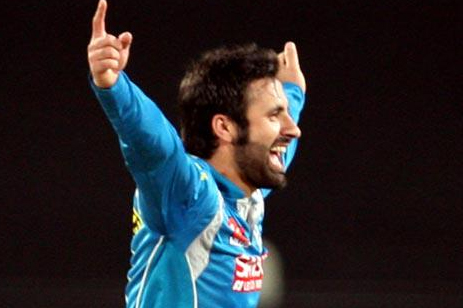
Parvez Rasool Zargar's life has not been bed of roses. The terrorists have threatened to kill him for playing cricket, but nothing has stopped Rasool from playing the game he loves the most. Today he is the face of Jammu and Kashmir cricket. Sarang Bhalerao looks at Parvez Rasool’s career thus far.
After warming the bench for 12 matches, a window of opportunity opened for Parvez Rasool on May 9, 2013 when the beleaguered Pune Warriors gave him the opportunity to make his Indian Premier League (IPL) debut. It was a joie de vivre for the people of Jammu and Kashimir — a state which is in the news for the wrong reasons. For the Kashmiri people, Rasool embodies true champion, a believer of the principle that grit and hard work takes you to places.
But life has not been bed of roses for this 24-year-old. In October 2009, Rasool was staying at the Chinnaswamy Stadium guest house as he was to play the CK Nayudu Trophy for under-22s against Karanataka at Bengaluru. There was a Champions League match between Victoria and Cape Cobra that was to take place at the venue in the evening. The police were carrying their usual security drill when all of a sudden they suspected that Rasool’s kitbag having traces of explosives. From a resourceful cricketer, Rasool had turned into a suspect and interrogated at the police station. But his coach Abdul Qayoom cleared the misunderstanding and Rasool was let off. The incident left a huge mental scar on the young cricketer.
Recalling the incident, Rasool had told The Times of India: "I could hardly sleep on the first night after the incident. I couldn't believe something like this had happened in my life. I had even thought of quitting the game. But once I started knocking the balls in the nets, I felt better and I decided to play this game."
Rasool scored 68 batting at No 4 in the game against Karnataka. He was batting amidst the realms of contrasting emotions, but he let his willow do all the talking.
He said: “I had to prove that I am a cricketer and not a terrorist, which I had to show with my bat.”
Rasool was proved innocent and the police apologised to the cricketer. According to the police the frisking instrument was faulty. How the technical glitch would have affected the career of Rasool is a matter of conjecture. Rasool’s inner fortitude helped him sail past this torrid time. An allegation he least expects to hear, considering his background. Rasool is a role model for many cricketers from Jammu and Kashmir.
Rasool was part of India A squad this year against England on the sheer weightage of his domestic performances. In the longer versions of the game, he had scores of 165 against Haryana and 167 against Delhi. In the 2012 Ranji season, he had 33 wickets and his highest score was an unbeaten 171 against Goa. He picked up seven for 41 against Assam and scored 120 in that game too.
“He’s very promising,” said former India captain and the coach of Jammu and Kashmir, Bishan Singh Bedi when he got to know about his pupil’s selection for India A. “Last year I said he was a better off-spinner than many and that put him under pressure. I withdrew my words so that he could go about his way comfortably. I’m happy to note that he has performed like a champion this season with the bat and the ball,” said Bedi.
Rasool credits his bowling success to Bedi. “It was on his [Bedi’s] insistence that I began to concentrate more on developing my bowling skills,” said Rasool.
The youngster’s story is truly inspiring. A terrorist outfit had sent a warning letter that he shouldn’t play cricket for India. But he didn’t bother about these threats and plied his trade diligently.
Against the Australians at Guru Nanak College ground, Chennai he picked up seven for 45 as a part of Board President’s XI member. He exposed Australia’s weakness of playing spin bowling. He sowed the seeds of suspicions in their minds and later Ravichandran Ashwin, Harbhajan Singh, Pragyan Ojha and Ravindra Jadeja carried on the with the work started by Rasool.
Rasool’s IPL debut is just a small step towards his ultimate goal of representing the country. Taking into account his drudgery and toil and the impressive performances that day might not be far when he becomes the third Kashmiri cricketer, after Vivek Razdan and Suresh Raina, to don the coveted India cap.





Comments
Add new comment